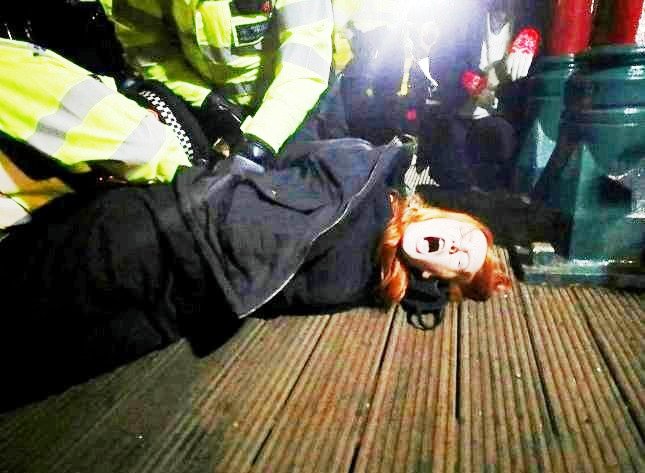London: Clashes broke out Saturday between police and people who gathered in defiance of coronavirus restrictions at an unofficial vigil for a London woman whose killing has spurred a national conversation in the UK about violence against women.
The hundreds who gathered on Clapham Common, near where marketing executive Sarah Everard last was seen alive on March 3, defied a police request to disperse and a judge’s order to honor her and to draw attention to the fear and danger many women see as a daily part of British life.
Everard disappeared while walking home from a friend’s apartment and was found dead a week later. The slaying sent shockwaves across the U.K. Because a police officer is charged with her kidnapping and murder.
Video of the informal vigil turned rally showed officers tussling with participants. Male officers grabbed hold of several women and led them away in handcuffs to screaming and shouting from onlookers, Britain’s Press Association reported.
Many participants laid flowers at a bandstand in the park. Among them was Kate, the Duchess of Cambridge, who was seen pausing for a moment in front of the sea of flowers. Other people held signs reading “We will not be silenced” and “She was just walking home,” and the crowd chanted, “Sisters united will never be defeated.”
The gathering happened hours after Metropolitan Police constable Wayne Couzens, 48, appeared in court for the first time since his arrest in Everard’s death. As Metropolitan Police officers approached the Clapham Common bandstand on Saturday evening, boos, jeers and shouts of “Shame on you” came from the crowd, according to the Press Association.
Organisers had hoped to hold “Reclaim the Streets” vigils in Everard’s memory at the south London location and in other U.K. Cities on Saturday but canceled the in-person events after a judge refused to grant an order allowing them to go on despite despite coronavirus restrictions that bar mass gatherings.
Hundreds of people showed up nonetheless.
London Mayor Sadiq Khan decried the police response.
“The police have a responsibility to enforce Covid laws, but from images I’ve seen it’s clear the response was at times neither appropriate nor proportionate,” Khan said on twitter.
Home Secretary Priti Patel tweeted that he had asked Metropolitan Police for a full report on what happened.
In the wake of Everard’s disappearance and killing, many women have taken to social media to share their own experiences of being threatened or attacked while walking outside.
A 33-year-old nurse who works in the Clapham area, Mel Clarke, said she felt “very conflicted” about attending Sturday’s gathering because of pandemic restrictions, but in the end “just felt that I needed to be here.”
“I’m really pleased that there are a lot of men here. I hope that this is kind of an opportunity for men to learn how women feel, how vulnerable we are,” Clarke said. “I hope that this is the start of justice being served for Sarah.”
The Metropolitan Police has expressed shock and horror that one of its own was a suspect in the case. The London police force said Couzens joined its ranks in 2018 and most recently served in the parliamentary and diplomatic protection command, an armed unit responsible for guarding embassies in the capital and Parliament.
During his court appearance earlier in the day, Couzens stood wearing a gray tracksuit as the charges were read to him. He was remanded into custody and has another appearance scheduled Tuesday at London’s Central Criminal Court.
Everard was last seen walking home from a friend’s apartment in south London at about 10:30 p.M. On March 3. Her body was found hidden in an area of woodland in Kent, more than 50 miles southeast of London, on Wednesday. A post-mortem examination is underway, police said Friday.
TV and radio presenter Sandi Toksvig said at the start of a vigil held online that a “cultural shift about how women are viewed and treated both in the public and private space” was needed.
“I am filled in equal measure with profound sorrow and rage, and I know there are many who share this rage, and I think it is entirely justifiable,” Toksvig said. “But I also know that it will harm rather than help us if we don’t try and direct that anger to good purpose.”
AP
